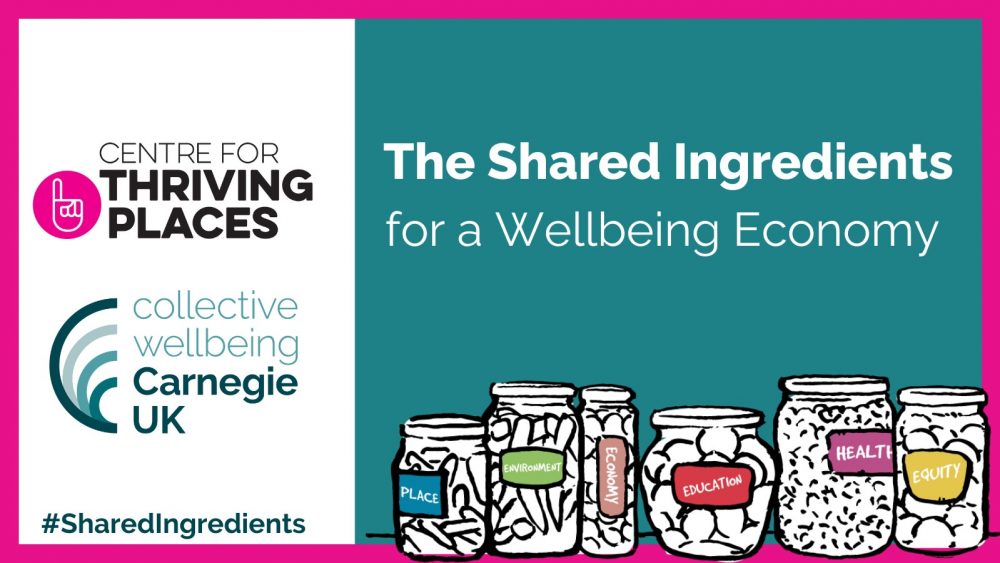Today sees the release of a discussion paper that outlines the ingredients needed to grow a fairer, greener and truly thriving economy
For over 60 years we have been fed an economic diet narrowly focussed on GDP growth. This has produced unimaginable wealth for the few, but the majority are largely excluded from the abundant table. The ingredients for this economy are chosen for short term gain, with little regard for sustainable sourcing and it is almost silent on waste. It’s an economy that is producing social injustice and climate catastrophe by design.
As we lurch from crisis to crisis, a growing number of leading thinkers, politicians and activists are calling for an urgent re-writing of this menu to produce an economy designed to feed us a diet of long term equitable and sustainable wellbeing.
It is a tough job however to rewrite the rules that have governed our consumption based economy for so long. To move from the simple ‘growth is all’ mantra to a more nuanced understanding of what supports people, places and the planet to truly thrive is not a simple task.
Thankfully, many brilliant minds, within what is increasingly being called the ‘wellbeing economy movement’ have applied themselves to produce new models with clear, evidenced goals, metrics, and principles. The downside is that it’s hard to work out what to do when faced with many great sounding options but no sense of how they fit together, or if they do.
There might be energy and interest in the Doughnut model but a lack of accessible data for decision makers to support it. A city might be attracted to the rigorous and practical data of the Thriving Places Index, but need help to adapt it to specific local needs. Leaders may push for frameworks based on the SDGs or the ONS wellbeing dashboard but struggle to localise it.
An overstretched civil servant or council officer battling to deliver from a stripped back and unsustainable system will be pushed to find the time and energy to work it all out. And for those in politics, the familiar status quo can feel a lot safer than taking a punt on backing a horse that may be outrun.
That’s why the Centre for Thriving Places, with support from Carnegie UK, are publishing a discussion paper: The Shared Ingredients for a Wellbeing Economy. It’s designed to help answer exactly these kinds of questions in simple, accessible ways.
The paper explores what the leading wellbeing models available in the UK today have to say about the drivers of our capacity to thrive. The research makes it clear there are remarkable levels of agreement about what really represents true ‘prosperity’ – ideas backed by strong evidence about what drives our capacity for better lives now and for generations to come. It uncovers shared ingredients present in every model and how those ingredients combine to produce powerful recipes for a very different economy that could be a reality today.
Here’s what we KNOW is required if we want the economy to deliver high levels of wellbeing.
It needs to promote secure, decently paid jobs that are invested in the fabric of local communities. It needs governance tuned for high levels of participation with a heavy emphasis on equity and human rights. It needs to generate good affordable housing with active travel and public transport, safe streets and ready access to vital services. It needs to nurture mental and physical health, learning and education and our ability to connect and participate in local life. All of this needs to happen in a clean and accessible environment which respects the natural world on which we all depend.
These are all fundamental drivers of individual and collective wellbeing – key ingredients which must feature strongly in the metrics and policies of any economic model that claims to benefit society.
As our current economic model disintegrates around us, it is heartening to know that this new wellbeing economy is taking root around the world. The tables are laid with all the fresh ingredients for prosperity that we need – and experienced, straight talking people who support practical action are there to help. Find out more in the discussion paper released today.
The Wellbeing Economy is open for business – and the thought leaders are keen to hear what you have to say…
Download PDF



Comments are closed.